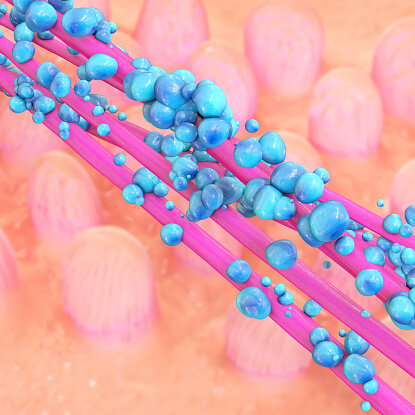A collaborative study involving Monash University has revealed specific gut microbiota signatures that may signal adverse body responses to cancer immunotherapy treatments.


Researchers studied a group of patients who were being treated for advanced melanoma with immune checkpoint blockade (ICB) – the main immunotherapy drugs currently used to treat cancer – to identify biomarkers of response and toxicity.
They found that higher levels of the bacterium Bacteroides intestinalis in the gut were associated with a greater likelihood of developing moderate to severe treatment-related side effects. Gut toxicity, typically presenting as inflammatory diarrhoea, was associated with high levels of the inflammatory protein IL-1β in the gut wall.
To determine whether this side-effect could be overcome, the researchers used mouse models to study the effects of the arthritis drug anakinra, which works by blocking the action of IL-1β. Encouragingly, mice receiving anakinra developed less gut inflammation following immunotherapy, without compromising the anti-cancer effect of the treatment.
The study also found that other bacteria, including Parabacteroides distasonis, were associated with better anti-cancer responses to treatment. Furthermore, subtle differences identified in immune cell populations in the blood could be useful as markers of toxicity, and point towards new ways of manipulating the immune system in order to reduce the risk of side effects.
The findings are published in Nature Medicine.
The study’s first author, Dr Miles Andrews from the Monash Central Clinical School, said: “Patients who responded to treatment tended to have more abundant immune cells and higher numbers of mutations in their tumours, similar to previous findings for single-drug immunotherapies.
“Importantly, the study found key differences in the communities of gut microbes comparing patients who experienced severe toxicity with those who didn’t.
“These findings open the doors to development of microbial therapeutics, or new combination immunotherapy recipes, that improve anti-cancer response, reduce toxicities, or both, thus making cancer immunotherapy a viable option for more patients.”
Immune checkpoint blockade agents have revolutionised survival and quality of life outcomes for patients with many types of cancer. They act by stimulating or reinvigorating anti-cancer immune responses that would otherwise be too weak or too exhausted to control the cancer.
Unfortunately, most patients don’t respond and there are currently no reliable methods to predict who will benefit and who will experience side effects. More intense regimens combining two ICB agents have higher response rates but this comes at the cost of much greater toxicity for the patient.
The gut microbiota have long been known to influence immunity through development and later life, and this relationship has flow-on effects on all kinds of human health and disease. In light of this, there has been intense interest in how gut microbes influence cancer development, progression, and immunotherapy outcomes in recent years.
“Originally this was mostly in the context of bowel cancer and a form of gut toxicity following bone marrow transplantation, but it’s increasingly clear that there are relevant interactions at a whole-body level that impact cancer immunotherapy,” said Dr Andrews.
Read the full paper in Nature Medicine titled: Gut microbiota signatures are associated with toxicity to combined CTLA-4 and PD-1 blockade
DOI:10.1038/s41591-021-01406-6








































